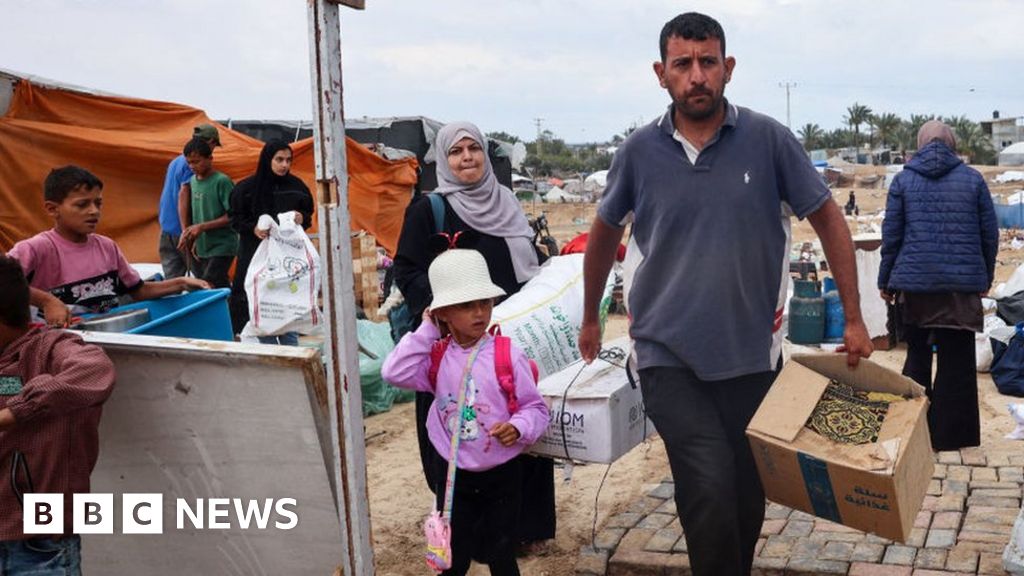
- Written by Natasha Brisky
- BBC News
Image source, Getty Images
There are disputes between Israel and Egypt over the Rafah border crossing, with each of them blaming the other for its continued closure as the humanitarian crisis in Gaza worsens.
Israeli forces took control of the Gaza Strip side of the crossing.
Israeli Foreign Minister Israel Katz said on Tuesday that he had informed the United Kingdom and Germany “of the necessity of convincing Egypt to reopen” the crossing.
But Egypt says that Israeli military operations in the region are preventing the passage of aid.
Cairo said that Israel was trying to shift the blame for blocking the aid.
Katz said that the armed Palestinian Hamas movement, which attacked southern Israel on October 7 last year, sparking the current war, was no longer able to “control the Rafah crossing,” citing security concerns that “Israel will not give up.”
“The world is placing responsibility for the humanitarian situation on Israel, but the key to preventing a humanitarian crisis in Gaza is now in the hands of our Egyptian friends,” Katz wrote on X.
Egyptian Foreign Minister Sameh Shoukry quickly responded to these statements with a statement affirming “Egypt’s categorical rejection of the policy of distorting facts and disavowing responsibility pursued by Israel.”
Shukri stressed that Israel is “solely responsible for the humanitarian catastrophe that the Palestinians are currently suffering in Gaza,” which he said is “a direct result of the random Israeli atrocities committed against the Palestinians for more than seven months.”
He called on Israel to “assume its legal responsibility as an occupying power by allowing aid to arrive through the land crossings under its control.”
Egypt was one of the mediators in the stalled ceasefire talks, but its relationship with Israel has been strained since Israel seized the Gaza side of the Rafah crossing on May 7.
António Guterres, Secretary-General of the United Nations, said in a statement that he was “appalled by the escalation of military activity in and around Rafah by the Israel Defense Forces.”
He reiterated calls for a ceasefire and the opening of the Rafah crossing, and continued: “These developments further hinder the arrival of humanitarian aid and exacerbate the already deteriorating situation.
“At the same time, Hamas continues to fire rockets indiscriminately. Civilians must be respected and protected at all times, in Rafah and elsewhere in Gaza. For the people in Gaza, there is no safe place now.”
The United Nations and international relief agencies said that the closure of the Rafah crossing and the Kerem Shalom crossing between Israel and southern Gaza effectively cut off the Gaza Strip from foreign aid.
Last week, US State Department spokesman Matthew Miller said that Israel has a duty to keep the Rafah crossing open and operate effectively.
In early May, Cindy McCain, head of the UN food agency, said she believed there was “mass famine” in northern Gaza “moving south.”
In its latest update, the Coordination of Government Activities Unit (COGAT), the Israeli military agency charged with coordinating the arrival of aid into Gaza, said that 64 aid trucks entered Gaza on Sunday, which represents a significant decrease from the daily number of trucks that entered in April.
Egypt also said on Sunday that it would intervene to support South Africa’s case against Israel at the International Court of Justice on the grounds of expanded Israeli military activity in Gaza and its impact on civilians.
On Friday, South Africa asked the International Court of Justice to order Israel to withdraw from Rafah as an additional emergency measure in the case that accuses Israel of committing genocide.
Israel said it would go ahead with its planned military operations in Rafah despite warning from the United States and other allies that a ground offensive could lead to large numbers of civilian casualties.
The Israeli military asked Rafah residents to move to Al-Mawasi — a narrow coastal area that Israel describes as an “extended humanitarian zone” — and Khan Yunis, which was largely in ruins after a previous Israeli military incursion there.
Israel launched a military campaign in Gaza after a Hamas attack on southern Israel on October 7, during which about 1,200 people were killed and 252 others were taken hostage, according to Israeli authorities.
More than 34,900 people have been killed in Gaza since then, according to the Hamas-run Health Ministry in the Strip.

“Travel specialist. Typical social media scholar. Friend of animals everywhere. Freelance zombie ninja. Twitter buff.”





More Stories
Taiwan is preparing to face strong Typhoon Kung-ri
Israel orders residents of Baalbek, eastern Lebanon, to evacuate
Zelensky: North Korean forces are pushing the war with Russia “beyond the borders”